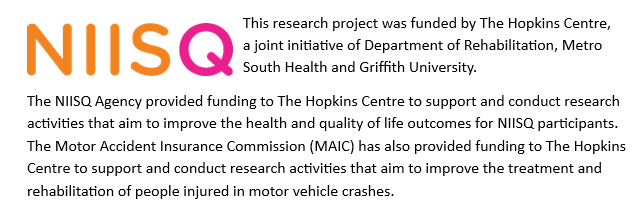SEED PROJECT - What effect does virtual reality-based nature exposure have on anxiety and depression in people with brain injury in a hospital rehabilitation ward?
About the Project
Chief Investigator: Dr Michael Norwood
Project Team: Susan Jones, Dr Leslie Gan, Dr Ali Lakhani, Prof. Louise Gustafsson, A/Prof. Matthew Browning, Isak Hollins, Amanda McAuley, Simona Knight, Olivia McAnirlin, Chelsea Marsh and Jayke Bennett.
Project Aims
This project explores how virtually delivered nature experiences can decrease psychological distress for patients in hospital rehabilitation wards. After significant trauma, the risk of psychological distress like depression, stress, and anxiety increases, yet effective management strategies in rehabilitation remain underexplored.
A promising approach lies where technology and nature intersect. Virtual nature exposure can reduce affective symptoms in populations for whom real nature is inaccessible. Clinicians are eager for solutions, and virtual nature exposure offers a promising avenue by combining technology with the therapeutic benefits of nature—especially for those who cannot access real outdoor environments.
The project’s main goal is to co-design and evaluate immersive virtual reality nature experiences to help reduce depression, stress, and anxiety. Additionally, we aim to explore how this innovative intervention can be effectively integrated into clinical practice.
This pilot seed grant study partners with clinician-researchers from the Gold Coast University Hospital and Logan Hospital, and extends on existing BEEhive virtual reality research.
This seed grant research project was funded by The Hopkins Centre – a joint initiative of Department of Rehabilitation, Metro South Health and Griffith University. The Motor Accident Insurance Commission provided funding to The Hopkins Centre to support and conduct research activities that aim to improve the treatment and rehabilitation of people injured in motor vehicle crashes.
Project Significance
The research progresses work that identifies models of environmental access. For populations that cannot access the natural environment and the benefits from being in the natural world, such as patients in hospital rehabilitation, VR could be one way of bringing the natural world to the patient. A partnership with The Virtual Nature lab in Clemson University is also an opportunity to be at the forefront of this burgeoning area of research.
By delivering nature exposure through VR, the progresses the work of the BEEhive lab which is situated in the GCUH neurosciences rehabilitation ward, and explores enriched environments that enable recovery and rehabilitation. The partnership with GCUH facilitates long-term translation and implementation; clinicians have already identified the potential for implementation of the research. As part of the RAP program at GCUH, patients can access the existing VR headsets to use this virtual nature content as soon as it is available.
This seed grant project builds upon previous Hopkins Centre research and BEEhive research (e.g., Lakhani et al., 2019; 2020; Norwood et al., 2019; 2022). Lakhani et al., (2020) found positive effects on anxiety and depression of virtual nature in people with SCI. This remains one of the few studies exploring virtual nature with populations for whom accessing nature is difficult.
Expected Outcomes
This research could lead to a novel way to reduce symptoms of mood disorders during inpatient ABI rehabilitation and support safe, effective use and uptake of technology to enable recovery and rehabilitation. The BEEhive collaboration provides a pathway for direct clinical translation, thus the research will inform rehabilitation practice at partnering hospitals. This project builds on previous research and if found to be effective, it will support grants for larger pieces of work around the impact of the natural environment on people during ABI rehabilitation.
Project Updates
2025: The feasibility study with sub-acute ABI patients in hospital settings found this approach both desirable and well-received.
Early results also showed meaningful improvements in symptoms of psychological distress (publication of results in process with peer-reviewed journal and will be shared shortly).
You can view the immersive virtual reality nature experience videos below that have been created to help reduce depression, stress and anxiety.
2024: The project has recently completed two stakeholder consultation workshops in December 2023 and January 2024, as well as received all research ethics and governance approvals and collected/ edited 360 videos of local national parks for use.
Immersive virtual reality nature experience videos

Click here to view the project flyer on your device.
Project Funding

View All Researchers

